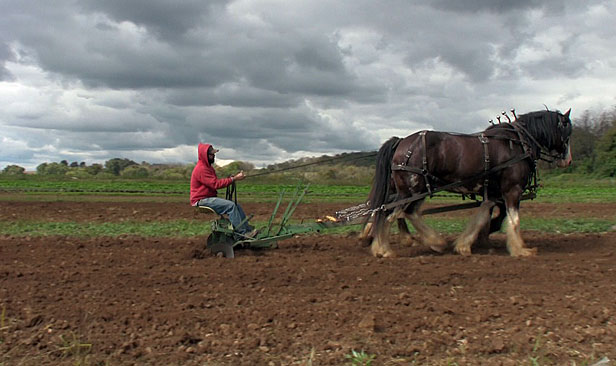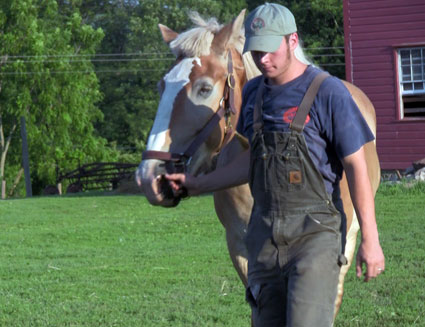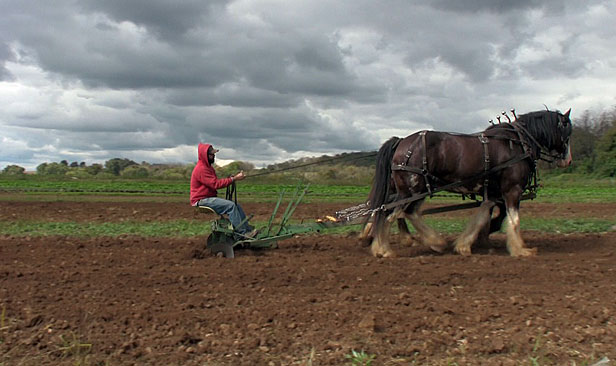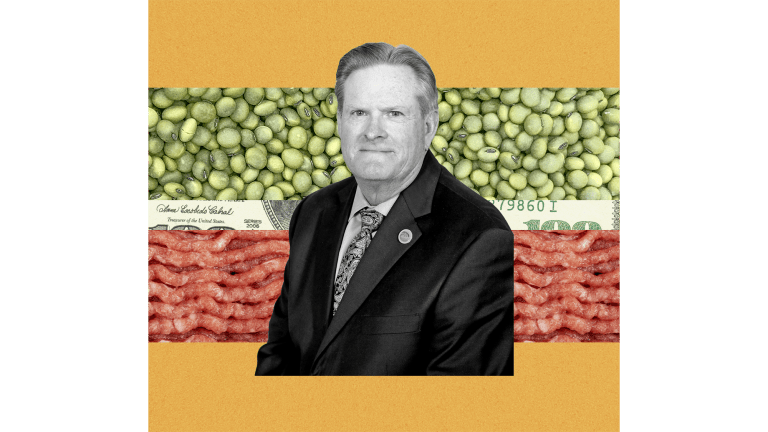 Steed for the tillerman: New Jersey farmer Tom Paduano at work(Photos by Jared Flesher)
Steed for the tillerman: New Jersey farmer Tom Paduano at work(Photos by Jared Flesher)
For the past year, I’ve been following around farmers in New Jersey with a video camera. For the most part, they are young, broke, landless, and optimistic.
“I’ve hit the jackpot. I’m getting rich. I’m farming,” deadpanned Aubrey Yarbrough, age 28, on a recent morning devoted to planting potatoes. She was only half kidding. As an intern on an organic vegetable farm near Princeton, she’s now bringing in nearly $1,000 per month, double what she made at her farming internship last year.
The protagonists of my documentary, The Farmer and the Horse, are all in their twenties, are all first-generation farmers, and all graduated college with degrees that had nothing to do with agriculture. They are like many Americans who have come to farming in search of hard, meaningful work, and with a desire to leave the world a better, more sustainable place.
What’s a little different about the farmers I’m following is that they are pursuing an extreme of sustainability that goes well beyond “organic.” They are trying to become horse farmers: not farmers who raise horses that trot on trails and run around racetracks, but farmers who don’t need tractors — or oil — because they drive huge draft horses powered by hay.
Why would someone choose to farm in a manner that is slower, harder, and likely less profitable than the status quo?
Amish farmers — many now living in Ohio, Pennsylvania, and Indiana — have never stopped using horses, of course. They do so for cultural reasons and toward a goal of preserving community. Horses in the field and on the road dictate a humane pace and a physical closeness. Cars, telephones, and tractors with lights represent an acceleration of that pace and a widening of distances.
The farmers I’ve met in New Jersey, however, are not Amish and they don’t shun technology. Tom Paduano, 29, has a degree in computer systems engineering. One image that has stuck with me is of Tom standing in an autumn field as he rested his horses. (Because unlike tractors, horses need to take breaks.) In one hand, Tom held the worn leather lines used to steer 3,500 pounds of authentic horsepower. In the other, he was working his cell phone, arranging to meet up with friends for dinner at Chili’s, a generic chain restaurant. The moment spanned 200 years of civilization.
Tom and others like him see horse farming as a sustainable, self-sufficient alternative to industrialized agriculture. No matter what happens at the tractor company, the oil company, or the synthetic nitrogen fertilizer company, the horse farmer keeps plowing and the hayfield never spills oil. The relationship between horse, hay, manure, and soil is a natural cycle energized not by fossil fuels, but by the sun. The horse is the solar panel, consuming sunlight and converting it into useful work.
 Matt Schofield hopes to own his own horse someday.(Photo by Jared Flesher)No one I’ve interviewed, it’s worth noting, expects that draft horses will ever retake America. The farmers I’ve met appear content to quietly follow their own counsel. They love the animals, the independence, the land, and the work. And they seem to draw strength from the simple idea that they are actually practicing what they believe is right.
Matt Schofield hopes to own his own horse someday.(Photo by Jared Flesher)No one I’ve interviewed, it’s worth noting, expects that draft horses will ever retake America. The farmers I’ve met appear content to quietly follow their own counsel. They love the animals, the independence, the land, and the work. And they seem to draw strength from the simple idea that they are actually practicing what they believe is right.
Matt Schofield, 24, is the youngest would-be horse farmer in the film. His bank account is near empty, and his chances of owning horses or land anytime soon look slim. But when Matt talks about one day owning a team of Canadian horses, his favorite breed, he speaks with the assurance of a man holding a ticket to the Promised Land. Matt is so certain of his future because he’s willing to make whatever sacrifice is called for.
“I have the ability to live pretty cheap,” he told me on a cold night last winter. “I can live in a tent. I don’t care what people think.”
And then? I asked.
“It’s going to look like a shoestring farm for a couple of years, but that’s just the beginning,” he said. “After everything gets up and running, it will be a well-oiled machine.”
Sans, of course, the oil and the machine.
The Farmer and the Horse is raising money for final editing and distribution: watch the trailer and pre-order a DVD via Kickstarter. A 10-minute preview of the film will screen on May 24 in New York City as part of the Hungry Filmmakers series.




